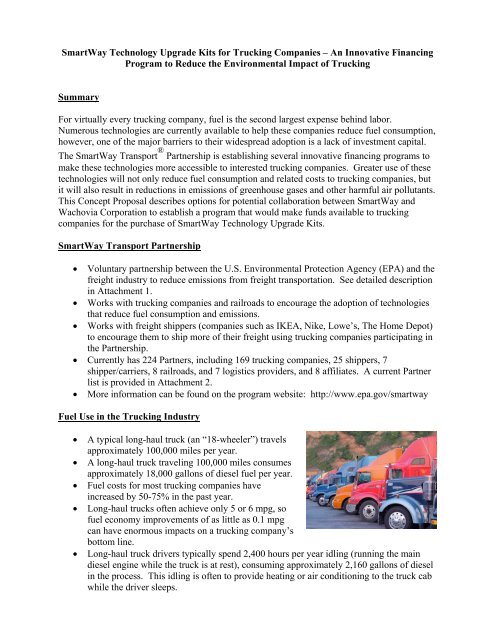SmartWay Technology Upgrade Kits for Trucking Companies – An ...
SmartWay Technology Upgrade Kits for Trucking Companies – An ...
SmartWay Technology Upgrade Kits for Trucking Companies – An ...
Create successful ePaper yourself
Turn your PDF publications into a flip-book with our unique Google optimized e-Paper software.
<strong>SmartWay</strong> <strong>Technology</strong> <strong>Upgrade</strong> <strong>Kits</strong> <strong>for</strong> <strong>Trucking</strong> <strong>Companies</strong> <strong>–</strong> <strong>An</strong> Innovative Financing<br />
Program to Reduce the Environmental Impact of <strong>Trucking</strong><br />
Summary<br />
For virtually every trucking company, fuel is the second largest expense behind labor.<br />
Numerous technologies are currently available to help these companies reduce fuel consumption,<br />
however, one of the major barriers to their widespread adoption is a lack of investment capital.<br />
The <strong>SmartWay</strong> Transport ® Partnership is establishing several innovative financing programs to<br />
make these technologies more accessible to interested trucking companies. Greater use of these<br />
technologies will not only reduce fuel consumption and related costs to trucking companies, but<br />
it will also result in reductions in emissions of greenhouse gases and other harmful air pollutants.<br />
This Concept Proposal describes options <strong>for</strong> potential collaboration between <strong>SmartWay</strong> and<br />
Wachovia Corporation to establish a program that would make funds available to trucking<br />
companies <strong>for</strong> the purchase of <strong>SmartWay</strong> <strong>Technology</strong> <strong>Upgrade</strong> <strong>Kits</strong>.<br />
<strong>SmartWay</strong> Transport Partnership<br />
• Voluntary partnership between the U.S. Environmental Protection Agency (EPA) and the<br />
freight industry to reduce emissions from freight transportation. See detailed description<br />
in Attachment 1.<br />
• Works with trucking companies and railroads to encourage the adoption of technologies<br />
that reduce fuel consumption and emissions.<br />
• Works with freight shippers (companies such as IKEA, Nike, Lowe’s, The Home Depot)<br />
to encourage them to ship more of their freight using trucking companies participating in<br />
the Partnership.<br />
• Currently has 224 Partners, including 169 trucking companies, 25 shippers, 7<br />
shipper/carriers, 8 railroads, and 7 logistics providers, and 8 affiliates. A current Partner<br />
list is provided in Attachment 2.<br />
• More in<strong>for</strong>mation can be found on the program website: http://www.epa.gov/smartway<br />
Fuel Use in the <strong>Trucking</strong> Industry<br />
• A typical long-haul truck (an “18-wheeler”) travels<br />
approximately 100,000 miles per year.<br />
• A long-haul truck traveling 100,000 miles consumes<br />
approximately 18,000 gallons of diesel fuel per year.<br />
• Fuel costs <strong>for</strong> most trucking companies have<br />
increased by 50-75% in the past year.<br />
• Long-haul trucks often achieve only 5 or 6 mpg, so<br />
fuel economy improvements of as little as 0.1 mpg<br />
can have enormous impacts on a trucking company’s<br />
bottom line.<br />
• Long-haul truck drivers typically spend 2,400 hours per year idling (running the main<br />
diesel engine while the truck is at rest), consuming approximately 2,160 gallons of diesel<br />
in the process. This idling is often to provide heating or air conditioning to the truck cab<br />
while the driver sleeps.


